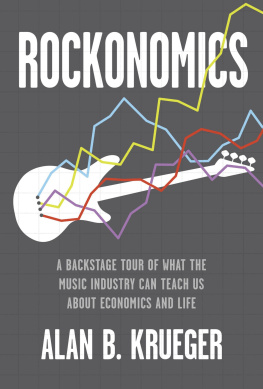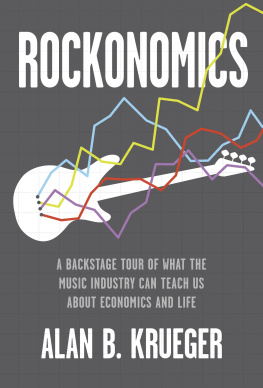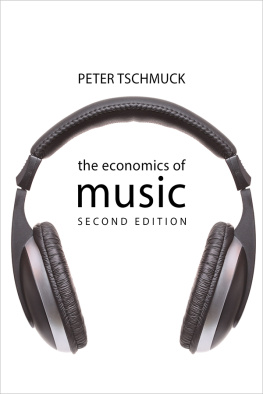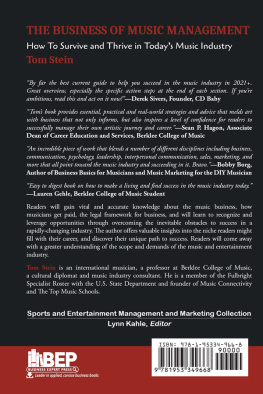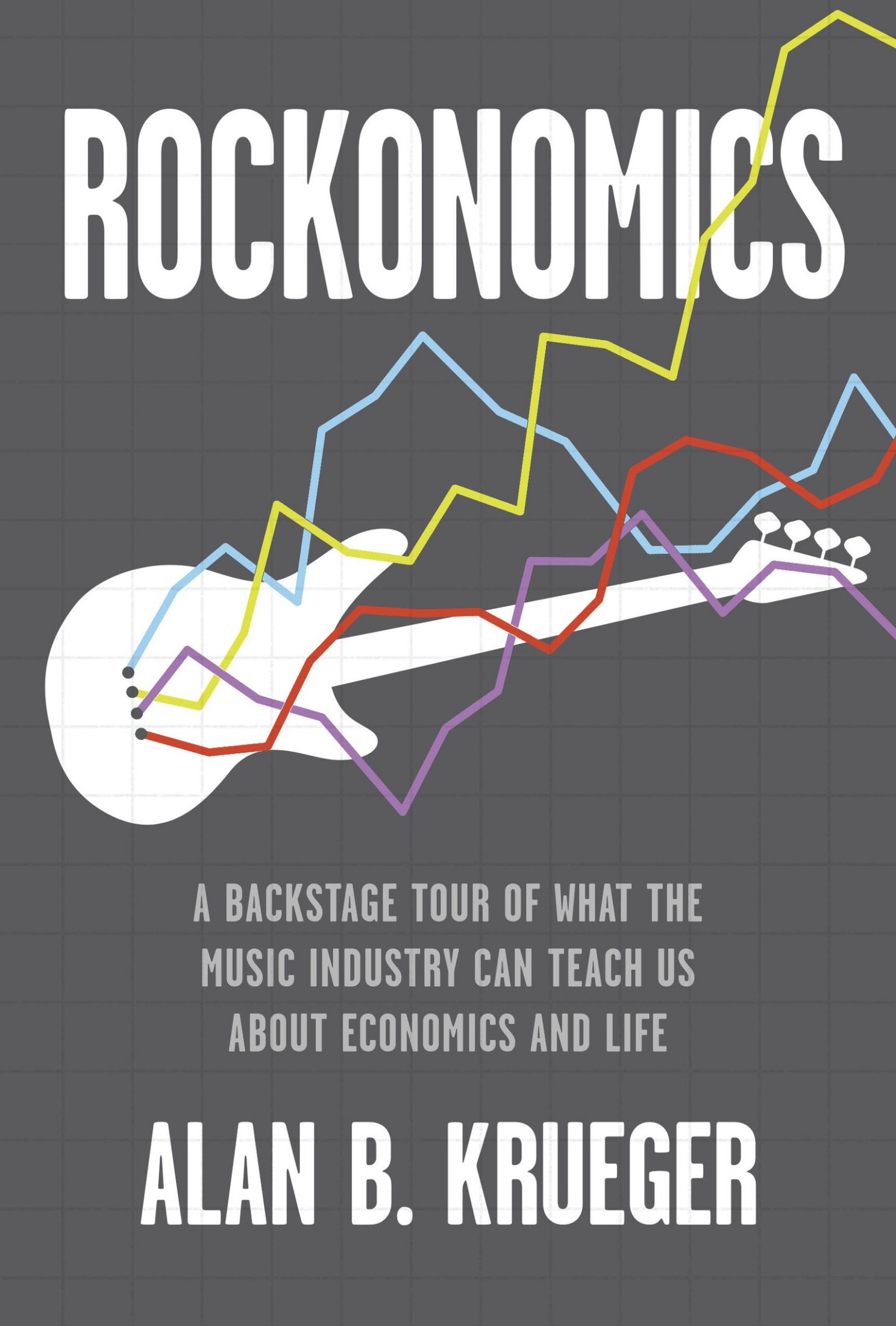
More Praise for
Rockonomics
If you like music (we learn here it would take six lifetimes just to listen to every song once) and going backstage to see how things work (touring, streaming, scalping) and the stories behind the stories (how Reginald Dwight met Bernie Taupin and became Elton John), then rock on! Or, in this case, RockOnOmics!
Andrew Tobias, author of The Only Investment Guide Youll Ever Need
Rockonomics is entertaining, educational, and enlightening. Alan Krueger gives us a backstage tour of the music industryand in doing so, he creates a brilliant metaphor for our entire economy. Highly recommended.
Harlan Coben, #1 New York Times bestselling author of Dont Let Go
Read this bookwhether you are a rock fan or, like me, think the Beatles and Stones were the last good groups. Read it because Alan Krueger makes the subject fun and demonstrates how the workings of this 0.1 percent of the US economy beautifully illustrate upcoming changes in the US and global economies.
Daniel S. Hamermesh, Distinguished Scholar at Barnard College and author of Spending Time and Beauty Pays
I actually majored in economics in college. A few years later, I bumped into a former classmate who asked me what I was doing. I told him I was handling rock radio promotion for Mercury Records. He said, What a waste of your education. I hope he reads Rockonomics so hell find out I didnt end up as a total loser.
Cliff Burnstein, cofounder of Q Prime with Peter Mensch, management firm for Metallica and the Red Hot Chili Peppers
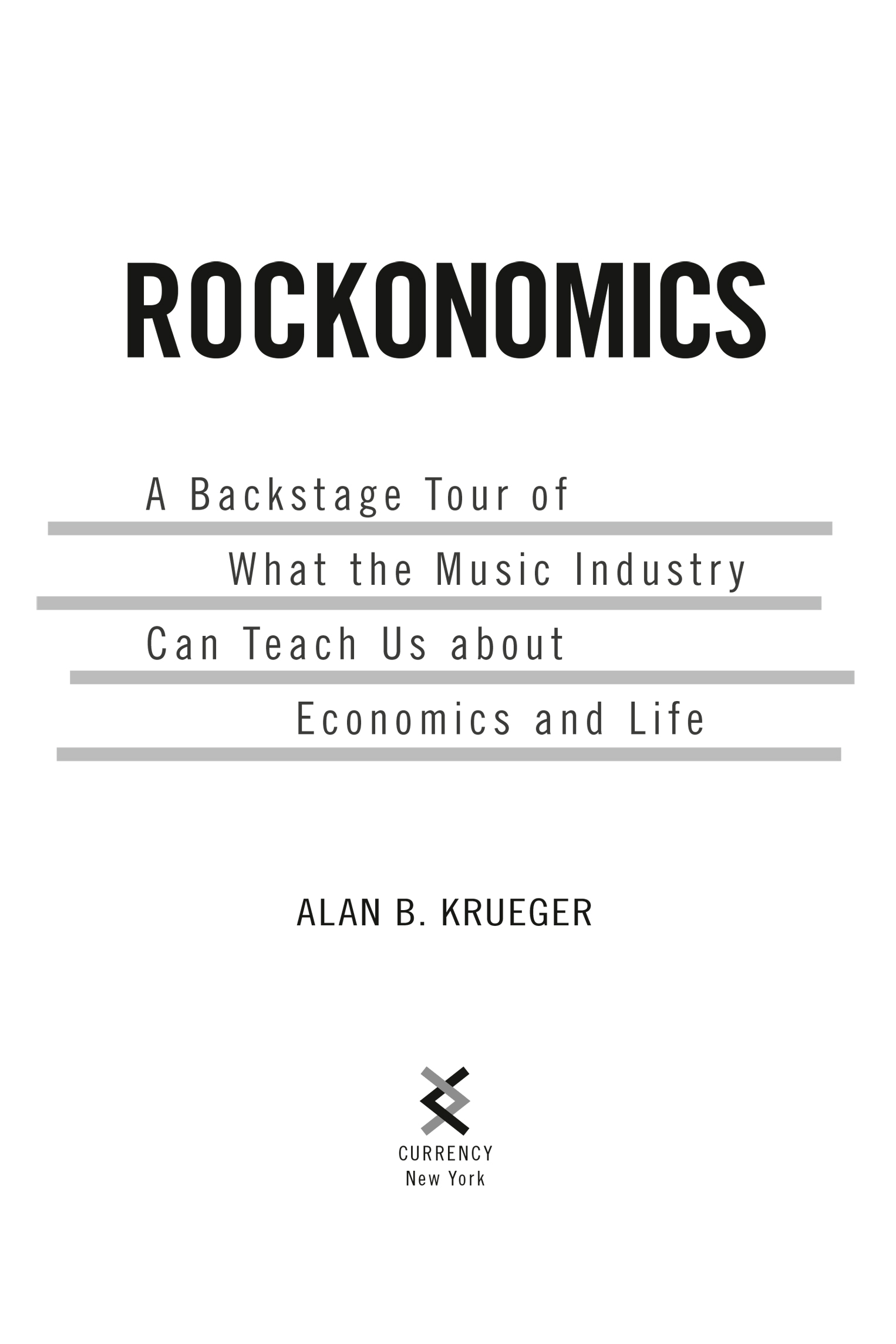
Copyright 2019 by Alan B. Krueger
All rights reserved.
Published in the United States by Currency, an imprint of the Crown Publishing Group, a division of Penguin Random House LLC, New York.
currencybooks.com
CURRENCY and its colophon are trademarks of Penguin Random House LLC.
Library of Congress Cataloging-in-Publication Data
Names: Krueger, Alan B. author.
Title: Rockonomics : a backstage tour of what the music industry can teach us about economics and life / Alan B. Krueger.
Description: First edition. | New York : Currency, [2019] | Includes bibliographical references and index.
Identifiers: LCCN 2018051993 | ISBN 9781524763718
Subjects: LCSH: Music trade. | MusicEconomic aspects.
Classification: LCC ML3790 .K77 2019 | DDC 338.4/7780973dc23
LC record available at https://lccn.loc.gov/2018051993
ISBN9781524763718
Ebook ISBN9781524763725
Cover design by Lucas Heinrich
Cover image: (guitar) i3alda/iStock/Getty Images
v5.4
ep
FOR LISA, JUST THE WAY YOU ARE
CONTENTS
CHAPTER 1
Prelude
Somebody said to me, But the Beatles were anti-materialistic. Thats a huge myth. John and I literally used to sit down and say, Now, lets write a swimming pool.
Paul McCartney
What walk-on music would you like? It was a question I had never been asked before or since. I was about to give a speech at the Rock and Roll Hall of Fame, and my hosts wanted to know which songs to play before I took the stage.
No, I wasnt about to be inducted into the Hall of Fame. Im not a musician and I cant even carry a tune. Im an economics professor at Princeton. I was then the chairman of the Presidents Council of Economic Advisers. I had been invited to speak because I had the idea of using the music industry as a metaphor to draw parallels with the U.S. economyin particular, the financial struggles of middle-class families and the growing gap between the wealthy and everyone else. The key theme was that the U.S. job market had become a superstar, winner-take-all affair, much like the music industry, where a small number of top performers did fabulously well, while almost everyone else struggled to make ends meet.
The speech used the term rockonomicsmeaning the economic study of the music businessto explain why this was happening, what it means for everyday Americans, and what should be done to bring about a fairer economy that works for everyone. I had a list of bold ideas to restore our national hopes and dreams. What better venue to give this speech than the Rock and Roll Hall of Fame in Cleveland?
My boss at the time, President Obama, liked the idea. Even better, he liked the speech. I sent him a copy when he was flying on Air Force One, and he subsequently announced at a meeting that everyone should read Alans speech. Soon I was getting requests for a copy from the labor secretary and commerce secretary.
This book expands on that original rockonomics metaphor to tell the story of how the whole U.S. economy has changed in recent yearsand how each of us can prepare for the changes in store in the twenty-first century. In my career Ive found, and psychological research supports, that we learn best not from abstract principles or equations but from stories. And music is all about telling stories.
Economics is also about telling stories, although the field has acquired the unfortunate and misleading reputation as the dismal science. Economic models, statistics, and regression analyses are all tools used for the purpose of telling stories with rigor and precision. We economists just dont tell the story very well or clearly. This is one of the reasons there was such strong rejection of expertise and basic economic concepts, including gains from trade and the value of impartial, objective economic statistics, during the 2016 U.S. presidential election. We need to find more convincing ways to share the lessons of economics. A broader audience might be willingeven eagerto listen if the story of the economic forces disrupting our world is told through the prism of the music industry. After all, music is one of the few endeavors that unites us, whatever our backgrounds or interests. Almost everyone has a connection to the music industry in one way or another. I call this a theory of one degree of separation, since we are intimately connected to music and the music industry in one way or another through friends, family, and associates.
To investigate the economic forces shaping the music industry, I conducted dozens of interviews with musicians and music industry executives, from up-and-coming performers and struggling singers to legendary members of the Rock and Roll Hall of Fame, from executives at Spotify and Amazon to those at Universal Music Group, the largest music company in the worldas well as the owner of my local record shop. (Yes, the Princeton Record Exchange still exists and is thriving, despite a challenging environment for retail stores.)
Ive interviewed iconic figures who have helped shape the music industry, including Gloria Estefan, the most successful crossover artist of all time, and Quincy Jones, the famed music impresario and performer who produced records for virtually every star from Frank Sinatra to Donna Summer and Michael Jackson. And I met often with Cliff Burnstein and Peter Mensch, the co-founders of Q Prime, which manages Metallica, Red Hot Chili Peppers, Cage the Elephant, Eric Church, and other successful bands. Marc Geiger, the swashbuckling head of music at William Morris Endeavor, shared his optimism for the future of the music biz with me, and top music industry lawyers Don Passman and John Eastman tutored me on music rights and record company contracts. To gain a birds-eye view of the work and effort involved in putting on a show, I tagged along with musicians and their crews to a number of gigs, and interviewed ushers, vendors, and executives at Live Nation and Ticketmaster.

